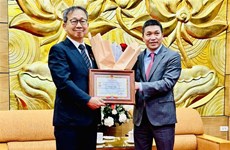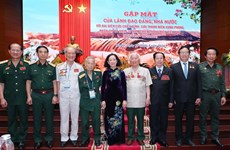East Sea situation analysed at Singapore workshop
International law, including the 1982 United Nations Convention on the
Law of the Sea, must be the bedrock of solving territorial disputes in
the East Sea.
International law, including the 1982 United Nations Convention on the
Law of the Sea, must be the bedrock of solving territorial disputes in
the East Sea.
This was the common opinion voiced by scholars at the third workshop on US-Japan Relations and Southeast Asia Dialogue held in Singapore on June 12-13.
They voiced particular concern over new security developments in Southeast Asia, particularly China’s provocative attitude and actions when settling territorial disputes with its neighbours.
The scholars agreed that China’s defiance of international law and regulations and threats of violence are worrying ASEAN member countries and the international community, potentially causing instability to regional security.
The situation requires ASEAN to unite and introduce more effective cooperation mechanisms, they said, adding that in addition to internal forces, the support from and multi-faceted cooperation with the US and Japan is also an important factor helping balance China’s bellicose rising to ensure long-term peace and stability in the region.
The head of the Vietnamese delegation, Hoang Anh Tuan, Director of the Institute for Foreign Policy and Strategic Studies, briefed participants on the latest East Sea developments, following China’s illegal placement of its Haiyang Shiyou-981 drilling rig in Vietnam’s waters in early May.
He focused on clarifying both the imminent and long-term impact of China’s acts on regional peace and stability, and on the interests of the parties involved.
Tuan called on nations inside and outside the region to raise their voice in order to force China to restrain itself and unconditionally withdraw its rig from Vietnam’s waters, as well as abide by international law and work together with ASEAN members towards the formation of a Code of Conduct in the East Sea.-VNA
This was the common opinion voiced by scholars at the third workshop on US-Japan Relations and Southeast Asia Dialogue held in Singapore on June 12-13.
They voiced particular concern over new security developments in Southeast Asia, particularly China’s provocative attitude and actions when settling territorial disputes with its neighbours.
The scholars agreed that China’s defiance of international law and regulations and threats of violence are worrying ASEAN member countries and the international community, potentially causing instability to regional security.
The situation requires ASEAN to unite and introduce more effective cooperation mechanisms, they said, adding that in addition to internal forces, the support from and multi-faceted cooperation with the US and Japan is also an important factor helping balance China’s bellicose rising to ensure long-term peace and stability in the region.
The head of the Vietnamese delegation, Hoang Anh Tuan, Director of the Institute for Foreign Policy and Strategic Studies, briefed participants on the latest East Sea developments, following China’s illegal placement of its Haiyang Shiyou-981 drilling rig in Vietnam’s waters in early May.
He focused on clarifying both the imminent and long-term impact of China’s acts on regional peace and stability, and on the interests of the parties involved.
Tuan called on nations inside and outside the region to raise their voice in order to force China to restrain itself and unconditionally withdraw its rig from Vietnam’s waters, as well as abide by international law and work together with ASEAN members towards the formation of a Code of Conduct in the East Sea.-VNA













